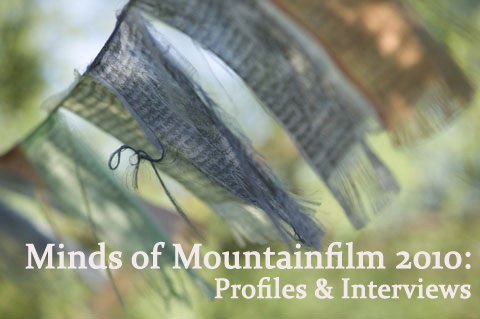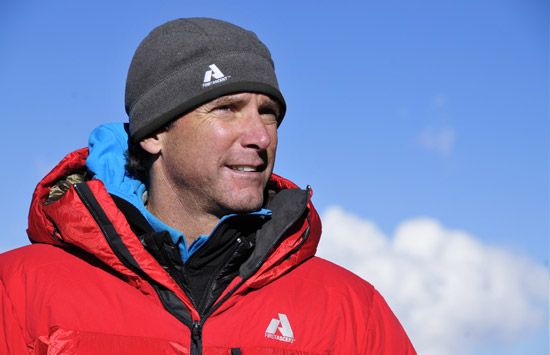Minds of Mountainfilm 2010: Mount Rainier Then and Now, by Peter Whittaker

Each Memorial Day weekend, artists and activists, filmmakers and photographers come to Telluride for Mountainfilm. At our core, we are about exploring, preserving and sustaining environments, cultures and conversations, so this unique gathering is part film festival and part ideas festival with leading edge thinkers – and doers – getting together to change the world. Leading up to this year’s festival we wanted to focus on conversations worth sustaining and we’ve asked some of Mountainfilm’s special guests to help us out. Throughout the coming weeks we’ll be posting our conversations with them. We hope that they engage and inspire you.
If you want to participate in this discussion, just submit your questions via our Facebook page or our Twitter account.
***
 Peter Whittaker has one of the most impressive resumes in the world of mountaineering. With over 25 years of professional guiding experience, he has ascended Mount Rainier literally hundreds of times, and led expeditions on every continent of the globe. He co-founded Rainier Mountaineering Inc., the largest mountaineering service in the world. Some say that he was rightfully born into the First Family of American mountaineering – Peter's father Lou and uncle Jim Whittaker are legendary mountaineers.
Peter Whittaker has one of the most impressive resumes in the world of mountaineering. With over 25 years of professional guiding experience, he has ascended Mount Rainier literally hundreds of times, and led expeditions on every continent of the globe. He co-founded Rainier Mountaineering Inc., the largest mountaineering service in the world. Some say that he was rightfully born into the First Family of American mountaineering – Peter's father Lou and uncle Jim Whittaker are legendary mountaineers.
On top of his exceptional adventure repertoire, he has also managed to host his own television show, and organize an expedition for breast cancer survivors to summit Aconcagua that raised $2.3 million dollars for breast cancer research.
His extensive outdoor experience also means that he has had first hand experience with an ever changing environment, and knows the value of protecting wilderness. We got a chance to catch up with Whittaker in between summits, and this is what he had to say when we asked him about the ties between adventure and sustaining the natural environment.
Mount Rainier. Then and Now.
I grew up with Mt. Rainier National Park as my backyard.
My first memories are of riding up the seasonal Poma lift at Paradise and skiing down. Or of hiking out to the Ice Caves at the Paradise Glacier; and swimming in Reflection Lake nestled at the base of the Tatoosh Range. I was eight years old when I first hiked up the snowfields to Camp Muir (10,080'). It was four years later, at the age of 12, when I stood on the summit for the first time. Since then I’ve climbed Rainier several hundred times and experienced firsthand the changes that have occurred on this great mountain.
My kids still have Rainier as their backyard. But it’s changed. There’s no lift-service skiing anymore. The Paradise Glacier is gone, which means no more ice caves. Swimming in Reflection Lake is no longer allowed. Sometimes, I feel a bit sorry for them. I wish that my kids could have the same experiences that I had growing up. But I shouldn’t. They play at the base of—and on—Mt. Rainier. They’re creating their own memories.
Change happens, of course, with or without human influence. Receding glaciers are an example of that. Of Rainier’s 26 glaciers, more than two-thirds are receding. Human influence? Don’t know. But the effects of global warming are undeniable. I’ve watched the Nisqually Glacier recede over a quarter of a mile, and the Paradise Glacier completely disappear. Are we directly responsible for this? Not for me to determine. But I do believe we can all become more responsible, environmentally.
Though melting glaciers are at the top of the list for me in terms of visible changes on Rainier, let me point out a few positive changes that I’ve watched over the years. The National Park Service has a difficult job balancing resource management and recreation. As a concessionaire at Rainier, obviously I’m pro-recreation. I make my living guiding climbers on the mountain. As one of the largest users of the resource, it’s our responsibility to reduce the impact on the mountain. Several examples:
1) “Turds on Top.” I first summitted in 1971. It was a hard climb, and I have many great memories of my first ascent. But what I still recall to this day is the amazing amount of freeze-dried turds on the crater rim. Fortunately, that’s a different story today. About 15 years ago, climbers were encouraged to crap in blue plastic bags and carry them down off the mountain. Two years later it became a requirement, and today the summit is far cleaner than when I first stood there 39 years ago.
2) “Social Ribbons.” The road to Rainier ends at Paradise (5,400') in the fragile alpine zone. The growing season varies from year to year, depending on the previous winter’s snowfall and the timing of the spring melt. Two to three months is pretty typical. In the 1970s, nobody paid much attention to “treading lightly” and “low impact hiking.” Trampling meadows and going cross-country was the norm. By the late seventies, it became clear that a lot of damage was occurring that could be minimized by consolidating hikers and also restoring some of the damaged meadows. Look at any pre-1980 photo of Rainier taken from Paradise and place it next to one from today and you’ll see a huge improvement. Social trails have disappeared, and meadow restoration has healed scars left by a generation with a different mindset.
I’m lucky to have grown up in the shadow of such an amazing mountain. And while it’s startling to see the changes that have occurred in my lifetime, such as glaciers receding and ice caves disappearing, our resource management has greatly improved. My kids, and (I believe) the kids of the future, are the beneficiaries of our increased care of the wilderness.